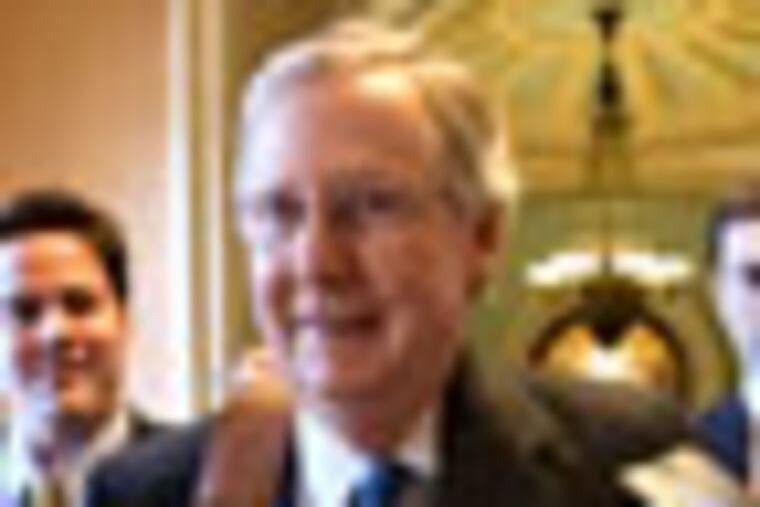Accord on cliff proves elusive
Senate leaders are still at odds; the GOP withdrew a contentious Social Security proposal.

WASHINGTON - A Capitol Hill deal to avert the "fiscal cliff" was proving elusive Sunday as a deadline to avert tax increases on virtually every American worker and block sweeping spending cuts set to strike the Pentagon and other federal agencies grew perilously near.
Senate Majority Leader Harry Reid (D., Nev.) and Senate Republican leader Mitch McConnell remained at odds on such key issues as the income threshold for higher tax rates and how to deal with inheritance taxes, among other issues. McConnell complained that Reid had yet to respond to a GOP offer made Saturday evening and reached out to Vice President Biden, a longtime friend, in hopes of breaking the impasse. Biden assumed the lead role for Democrats, and a McConnell spokesman said the Kentucky Republican and the vice president were expected to negotiate by telephone into the night.
Rank-and-file lawmakers left the Capitol on Sunday night with hopes that their leaders would give them something to vote on when they returned Monday morning.
One sign of progress came as Republicans withdrew a long-discussed proposal to slow future cost-of-living increases for Social Security recipients as part of a compromise to avoid the cliff. Democrats said earlier Sunday that proposal had put a damper on the talks, and Republican senators emerging from a closed-door GOP meeting said it was no longer part of the equation.
"I was really gratified to hear that Republicans have taken their demand for Social Security benefit cuts off the table. The truth is they should never have been on the table to begin with," Reid said late Sunday afternoon. "There is still significant distance between the two sides, but negotiations continue."
At stake are sweeping tax increases and across-the-board spending cuts set to take effect at the turn of the year. Taken together, they have been dubbed the fiscal cliff, and economists warn the one-two punch - which leaders in both parties have said they want to avoid - could send the still-fragile economy back into recession. Tax cuts enacted in 2001 and 2003 expire at midnight Monday, and $109 billion in across-the-board cuts in federal spending this year would also begin this week.
Workers could see more taxes withheld from their paychecks and federal agencies are likely to soon receive warning of possible furloughs if lawmakers fail to reach a deal to avert the cliff. The new Congress will be sworn in on Thursday and would inherit the problem if the current crop of lame-duck lawmakers can find no answer before then.
Sen. Richard J. Durbin (D., Ill.) said the two sides remained at odds over the income threshold for higher tax rates and tax levels on large estates. Republicans said that Democratic demands for new money to prevent a cut in Medicare payments to doctors and renew jobless benefits for the long-term unemployed should be financed with cuts elsewhere in the budget. Republicans also balked at a Democratic proposal to use new tax revenues to shut off the across-the-board spending cuts, known as a sequester in Washington.
President Obama, in a televised interview, blamed Republicans for putting the nation's economy at risk. "We have been talking to the Republicans ever since the election was over," Obama said in the interview that was taped Saturday and aired Sunday on NBC's Meet the Press. "They have had trouble saying yes to a number of repeated offers."
"The mood is discouraged," said Sen. Joe Lieberman, a Connecticut independent who caucuses with Democrats. "The parties are much further apart than I hoped they'd be by now."
The pessimistic turn came as the House and Senate returned to the Capitol for a rare Sunday session. Reid and McConnell had hoped to have a blueprint to present to their rank and file by mid-afternoon.
Obama pressed lawmakers to start where both sides say they agree - sparing middle-class families from looming tax increases.
Gone is the talk of a grand deal that would tackle broad spending and revenue demands and set the nation on a course to lower deficits. Obama and House Speaker John A. Boehner were once a few hundred billion dollars apart on a deal that would have reduced the deficit by more than $2 trillion over 10 years.